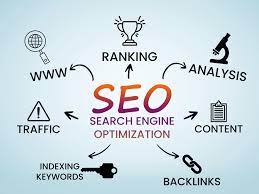The Best SEO Analysis: Boost Your Website’s Performance
Search Engine Optimization (SEO) analysis is a crucial tool for any website looking to improve its visibility and ranking on search engine results pages. By conducting a comprehensive SEO analysis, you can identify areas for improvement and develop a strategy to enhance your website’s performance.
Key Benefits of SEO Analysis:
- Identifying Keywords: An SEO analysis helps you identify relevant keywords that your target audience is searching for. By optimizing your content with these keywords, you can attract more organic traffic to your site.
- Competitor Analysis: Understanding your competitors’ strategies can provide valuable insights into how to improve your own website. An SEO analysis allows you to evaluate competitor keywords, backlinks, and content strategies.
- Technical Audit: A technical audit uncovers issues on your website that may be affecting its performance on search engines. This includes factors like site speed, mobile-friendliness, and broken links.
- Content Evaluation: Analyzing the quality and relevance of your website’s content is essential for SEO success. By conducting an SEO analysis, you can determine which pages need improvement or optimization.
Choosing the Best SEO Analysis Tool:
There are numerous tools available for conducting an SEO analysis, each offering unique features and capabilities. Some popular options include SEMrush, Ahrefs, Moz Pro, and Google Search Console. When selecting an SEO analysis tool, consider factors such as keyword research capabilities, backlink analysis, technical auditing features, and reporting functionalities.
Implementing SEO Recommendations:
Once you have completed your SEO analysis and identified areas for improvement, it is essential to implement the recommended changes promptly. This may involve optimizing meta tags, improving site speed, updating content, building quality backlinks, and fixing technical issues. Regularly monitoring and adjusting your SEO strategy based on performance data is key to achieving long-term success.
In Conclusion
An effective SEO analysis is a powerful tool for enhancing your website’s visibility and attracting more organic traffic. By identifying opportunities for optimization and implementing best practices, you can improve your search engine ranking and ultimately drive more visitors to your site. Invest in the best SEO analysis tools and strategies today to take your online presence to the next level!
Top 7 Essential Tips for Effective SEO Analysis
- Conduct thorough keyword research to target the right terms
- Optimize on-page elements such as titles, meta descriptions, and headers
- Improve website loading speed for better user experience and SEO performance
- Create high-quality, relevant content that engages users and attracts backlinks
- Monitor and analyze your website’s performance using tools like Google Analytics and Search Console
- Optimize images with descriptive filenames and alt text for improved visibility in image search results
- Regularly audit your website for technical SEO issues like broken links or duplicate content
Conduct thorough keyword research to target the right terms
Conducting thorough keyword research is a fundamental aspect of effective SEO analysis. By identifying and targeting the right terms that your target audience is searching for, you can optimize your content to attract relevant traffic to your website. Understanding the search intent behind specific keywords allows you to create valuable and engaging content that resonates with users, ultimately improving your website’s visibility and ranking on search engine results pages.
Optimize on-page elements such as titles, meta descriptions, and headers
Optimizing on-page elements, such as titles, meta descriptions, and headers, is a critical aspect of conducting the best SEO analysis for your website. These elements play a significant role in how search engines interpret and rank your content. By ensuring that your titles are concise and relevant, meta descriptions are engaging and informative, and headers are properly structured with relevant keywords, you can improve your website’s visibility and click-through rates. Paying attention to these on-page elements not only enhances user experience but also signals to search engines the relevance and quality of your content, ultimately boosting your website’s performance in search results.
Improve website loading speed for better user experience and SEO performance
Improving your website loading speed is a crucial aspect of conducting the best SEO analysis. A fast-loading website not only enhances user experience by reducing bounce rates and keeping visitors engaged but also plays a significant role in boosting SEO performance. Search engines prioritize websites that load quickly, as it indicates a better user experience. By optimizing your website’s loading speed, you can improve your search engine rankings and ensure that users have a seamless browsing experience, ultimately leading to higher traffic and conversions.
Create high-quality, relevant content that engages users and attracts backlinks
Creating high-quality, relevant content that engages users and attracts backlinks is a fundamental tip for effective SEO analysis. By producing content that is valuable, informative, and tailored to your target audience’s interests, you can increase user engagement and encourage other websites to link back to your content. This not only enhances your website’s authority and credibility in the eyes of search engines but also drives organic traffic and improves your search engine ranking. Consistently delivering compelling content that resonates with users is key to building a strong online presence and maximizing the impact of your SEO efforts.
Monitor and analyze your website’s performance using tools like Google Analytics and Search Console
Monitoring and analyzing your website’s performance is essential for effective SEO analysis. By utilizing tools such as Google Analytics and Search Console, you can gain valuable insights into how users interact with your site, track key metrics like traffic sources and user behavior, and identify areas for improvement. These tools provide detailed data that can help you make informed decisions to optimize your website for better search engine rankings and overall user experience. Regularly monitoring and analyzing this data allows you to stay ahead of the curve and continually refine your SEO strategy for optimal results.
Optimize images with descriptive filenames and alt text for improved visibility in image search results
Optimizing images with descriptive filenames and alt text is a valuable tip to enhance your website’s SEO performance. By using relevant keywords in the filenames and alt text of your images, you can improve their visibility in image search results. This practice not only helps search engines understand the content of your images but also provides an opportunity to attract organic traffic through image searches. Implementing this strategy can contribute to overall SEO success by making your website more discoverable and engaging for users searching for visual content online.
Regularly audit your website for technical SEO issues like broken links or duplicate content
Regularly auditing your website for technical SEO issues, such as broken links or duplicate content, is essential for maintaining a healthy and optimized online presence. By identifying and addressing these issues proactively, you can ensure that search engines can crawl and index your site effectively, improving your chances of ranking higher in search results. Resolving technical SEO issues not only enhances user experience but also demonstrates to search engines that your website is well-maintained and trustworthy, ultimately contributing to better overall performance and visibility online.




